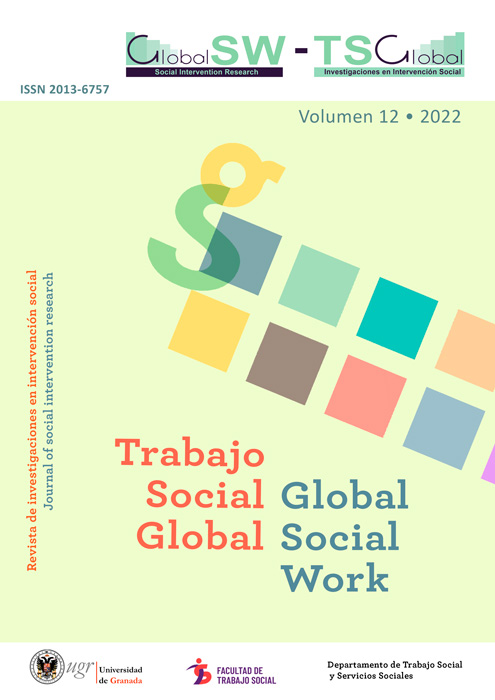Design and validation of the questionnaire for the inclusive assessment of the "philosophical potentials" of people with intellectual (dis)abilities based on the "Free Thinking Approach"
DOI:
https://doi.org/10.30827/tsg-gsw.v12.22389Keywords:
Free thought, capabilities, emancipatory research, philosophical potentials, inclusiveness, epistemic injusticeAbstract
This article presents the first validated study of capacities (understood as "philosophical potentials") of people with intellectual (dys)ability or intellectual functional diversity. The research carried out aims to assess three specific philosophical potentials: firstly, thinking potentials understood as processes of critical empowerment and not only as cognitive skills, in these potentials, the importance of people's philosophical questions is an indispensable element; secondly, creative potentials understood as processes of divergent or lateral reasoning in which alternative solutions to real or imaginary problems are sought; and thirdly, moral potentials understood as decision-making processes that take into account the ethical and emotional dimension of any person as part of a moral and political community. This questionnaire uses the methodology called "Free Thinking Approach" in contexts of cognitive disadvantage, a methodology that is inspired by the "Lipman methodology" and other methodologies from the field of emotional education and values education. The conclusion we have reached is that the validation of this questionnaire confirms the importance of the "philosophical dialogue" in the processes of empowerment of people with cognitive disadvantages [...]
Downloads
References
Álvarez, F., Baño, L., Campagne, J., Cortés, V., Huertas, M., Merino, J. y Prieto, L. (2022). Enfoque Pensamiento Libre: empoderamiento educativo de las personas adultas con discapacidad intelectual. Revista Internacional de Filosofía Aplicada HASER, 13(13), 105–149.
Barnes, C. (1996). Disability and the myth of the independence researcher. Disability and Society, 11(1), 107-110.
Barton, L. (2008). Superar las barreras de la discapacidad. Morata.
Campbell, J. & Oliver, M. (1996). Disability Politics: understanding our past: changing our future. Routledge.
Finkelstein, V. (1996). Outside “Inside Out”. Coalition, April, 30-36.
Fricker, M. (2015). Epistemic Contribution as a Central Human Capability. In G. Hull (Ed.), The Equeal Society: Essays on Equality in Theory and Practice (pp.73-90). Lexington Books.
Fricker, M. (2017). Injusticia epistémica. Herder.
Lacan, J. (2009), Escritos 1. Siglo XXI.
Lipman, M. (1992). La Filosofía en el aula. De la Torre.
Naciones Unidas. (2008). Convención Internacional de las Naciones Unidas sobre los Derechos de las Personas con Discapacidad
Nussbaum, M. (2012). Crear capacidades. Paidós.
Oliver, M. (2008). Políticas sociales y discapacidad. En L. Barton (Ed.), Superar las barreras de la discapacidad (pp.19-33). Morata.
Rolph, S. (2000). The History of Community Care for People with Learning Dofficulties in Norfolk of two hostels [Tesis inédita], Open University, Milton Keynes.
Sánchez Alcón, Ch. (2011). Pensamiento Libre para personas con discapacidad intelectual. Pirámide.
Sánchez Alcón, Ch. (2020). Forclusión: Una categoría epistémica para el análisis de la "discapacidad intelectual. Intersticios, Revista Sociológica de Pensamiento Crítico, 14(1), 5-11.
Schramme, T. (2021). Capable deliberators: towards inclusion of minority minds in discourse practices”. Critical Review of International Social and Political Philosophy. https://doi.org/10.1080/13698230.2021.2020550
Sen, A. (1995). Nuevo examen de la desigualdad. Alianza.
Townsley, R. (1988). Information is power: the impact of accessible information on people with learning difficulties. In L. Ward (Ed.), Innovations in Advocacy and Empowerment for People with Intellectual Disabilities (pp. 124-156). Lisieux Hall.
Williams, V. (1999). Researching together. British Journal of Learning Disabilities, 27(2), 48-51. https://doi.org/10.1111/j.1468-3156.1999.tb00085.x
Downloads
Published
How to Cite
Issue
Section
License
Authors publishing in this journal agree to the following terms:
- Authors retain their copyright. They guarantee to this journal the right to a first publication of the work submitted to initiate the editorial process.
- Authors know that their work is published under a Creative Commons License which allows others to share it, with a recognition of the work's authorship and its initial publication in this journal.
- Authors share with Global Social Work explotation rights of the work that has been published in this journal, authorizing the execution of a free reproduction, distribution and public communication. Authors know that their work will be stored on servers and reproduced in digital format for inclusion in institutional repositories and databases that will facilitates free access to the full text of the work.
- Authors may distribute the version of the work published in this journal (for example, to an institutional repository or publish it in a book), with the explicit acknowledgment of its initial publication in this journal.
Copyright on the texts published in Trabajo Social Global -Global Social Work, as well as editorial policy of the journal refering to self-file and deposit in institutional or thematic repositories, are identified in the database





















